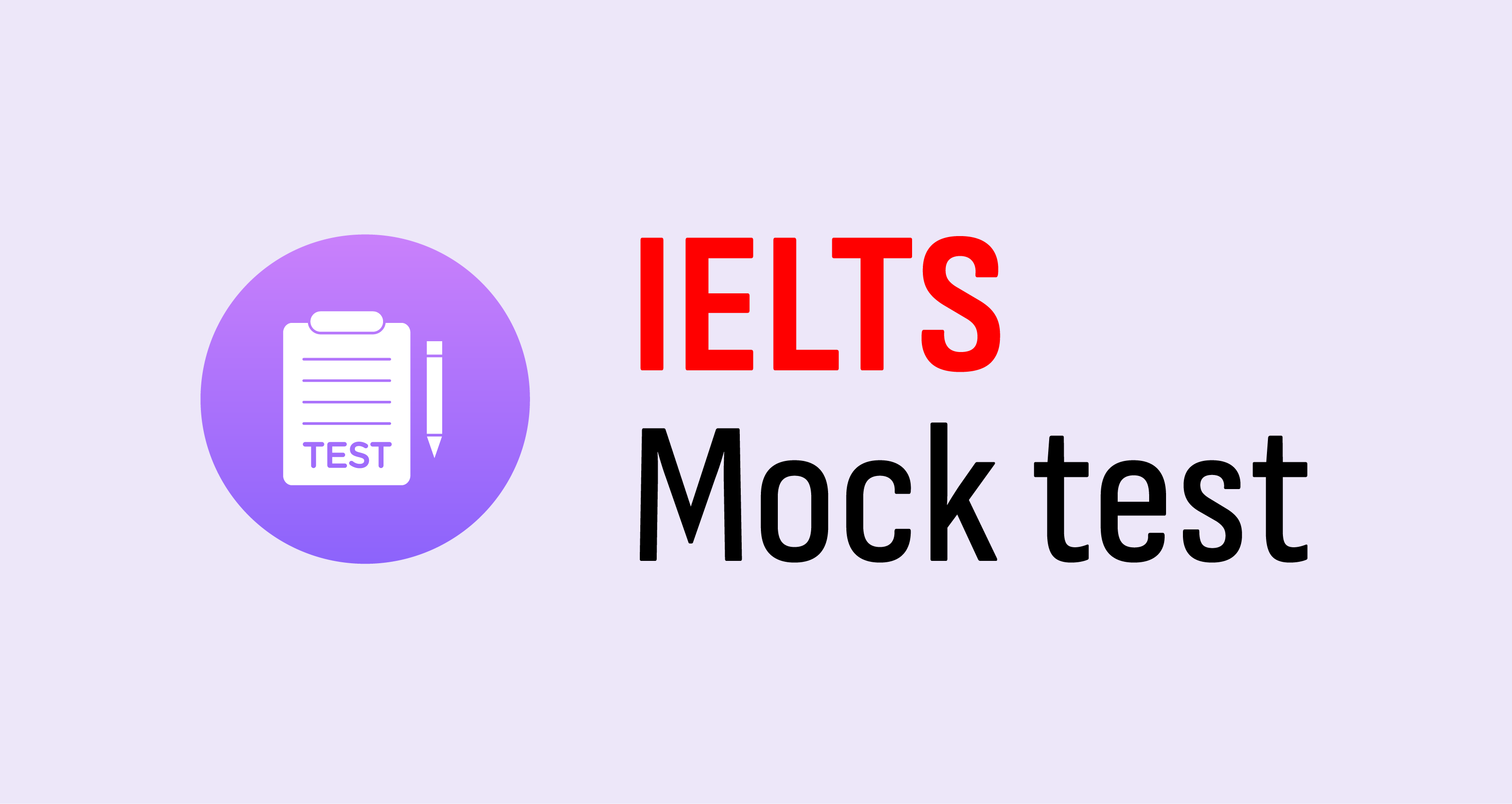
Standard environment
A standard environment provides a consistent setting for testing and development.

Amplified Headphone for listening
Amplified Headphone is designed to enhance the audio experience.

Reading and Writing Materials
Reading and writing materials are essential for communication.
Our Mock Tests
Top Course Categories
Featured Courses

Register for IELTS Now and Boost Your Future! 🚀🚀
Join our IELTS registration and take the first step towards achieving your dreams. Our IELTS registration process is simple and straightforward. By registering, you will gain access to all the resources and support you need to excel in your IELTS exam. Don't miss this opportunity to enhance your future prospects. Sign up today and embark on your journey to success!
Register Now

What our Students says about us
We are proud to have the opportunity to work with some of the best students in the world. Here's what they have to say about their experience with us.

150k +
Top rated Courses
Learn & Grow Your Skills From Unialoy
Unialoy is a platform that offers a wide range of online courses. We are a team of dedicated professionals who are passionate about teaching and helping students to grow their skills.
-
Life time Access
Learn on your schedule. Anytime, anywhere. Learn and practice real-world skills and achieve your goals.
-
Learn from Anywhere
Learn on your schedule. Anytime, anywhere. Learn and practice real-world skills and achieve your goals.
Have a look on our news
 IELTS
IELTS
IELTS on Computer or Paper?
 IELTS
IELTS
IELTS Academic & UKVI IELTS
 IELTS
IELTS
IELTS: Your Comprehensive Guide to Success
Frequently Asked Questions?
To improve your IELTS scores in tasks that involve describing images, focus on building a clear and organized response. Start by understanding the type of image presented, whether it’s a chart, graph, or picture, and identify the key information or trends. Structure your answer by introducing the image, highlighting important details, and providing a concise summary. Use a variety of vocabulary to describe trends or features accurately and avoid repetition. Practice describing different types of images under timed conditions to improve fluency and confidence, and review model answers to learn effective strategies.
To improve your oral fluency score in the IELTS Speaking test, focus on practicing regularly to build confidence and smoothness in your speech. Engage in daily conversations or monologues in English, making sure to speak at a steady pace without long pauses or overusing filler words like "um" or "uh." Expanding your vocabulary will help you express yourself more easily, allowing for a natural flow of ideas. Recording yourself while speaking on various topics can help identify areas where you may hesitate or struggle to find words. Staying calm and relaxed during the test is key to maintaining fluency, so practice relaxation techniques and familiarize yourself with common IELTS topics to reduce anxiety. By incorporating these strategies, you'll enhance your ability to speak clearly and confidently.
To improve your IELTS Written Discourse score, it's essential to focus on the logical flow and coherence of your writing. Start by organizing your essay with a clear structure: an introduction, body paragraphs, and a conclusion. Each paragraph should have a clear main idea and be logically connected with transition words like "however," "therefore," and "in addition" to guide the reader. Use a variety of sentence structures to make your writing more engaging and avoid repetition. Pay attention to paragraphing, ensuring each section develops a specific point and contributes to the overall argument. Finally, practice writing on a variety of topics, reviewing model essays to understand how effective discourse is created. By focusing on these areas, you’ll improve the clarity, flow, and overall structure of your written responses.
To improve your performance on the "Repeat Sentence" task in the IELTS Speaking test, focus on developing both your listening and speaking skills. Start by enhancing your short-term memory through exercises that involve listening to short sentences and repeating them aloud immediately. This practice will help you retain and reproduce sentences more accurately. Active listening is crucial; ensure you grasp the meaning and structure of each sentence upon hearing it, which allows for a more natural repetition, even if you don't recall every word. Additionally, work on your pronunciation and intonation by imitating native speakers, as replicating their rhythm and stress makes your response sound more fluent. Breaking longer sentences into manageable chunks can also help, making it easier to repeat each section accurately. Lastly, consider recording yourself during practice sessions to evaluate your accuracy and fluency, enabling you to identify areas for improvement. With consistent effort and focus, you’ll see significant advancements in this task.
To achieve a high score in the IELTS Summarize Written Text task, it’s essential to develop strong reading comprehension and summarization skills. Start by carefully reading the provided text to understand its main ideas, supporting details, and overall structure. Identify the key points and make notes as you go, which will help you focus on the most important information. When crafting your summary, aim to express these key ideas in your own words while maintaining clarity and coherence. Use a range of vocabulary and sentence structures to demonstrate your language proficiency, and be sure to follow any word limit guidelines specified in the task. Additionally, practice summarizing various types of texts to familiarize yourself with different styles and topics. Reviewing model summaries can also provide insight into effective summarization techniques. By honing these skills and practicing regularly, you'll enhance your ability to produce concise and accurate summaries, ultimately improving your score.
To improve your score in the IELTS Retell Lecture task, it's crucial to enhance your listening comprehension and summarization skills. Start by actively listening to lectures or talks in English, focusing on understanding the main ideas, supporting details, and the overall structure of the content. Taking notes while listening can help you capture key points and important information, which will be invaluable when you retell the lecture. When preparing your retelling, aim to summarize the main themes clearly and concisely, using your own words while maintaining the original meaning. Practice organizing your retellings logically, starting with an introduction of the topic, followed by the main points, and concluding with a summary. Additionally, work on your pronunciation and fluency, as clear and confident delivery is essential for a higher score. Regularly practice with various topics to familiarize yourself with different lecture styles and improve your ability to recall and retell information accurately. By focusing on these strategies, you'll enhance your performance in the Retell Lecture task.
To improve your IELTS reading score in the exam, focus on developing effective reading strategies and practice techniques. Start by familiarizing yourself with the test format, which includes three sections with various question types such as multiple choice, matching headings, and true/false/not given. Practice skimming and scanning techniques to quickly identify key information in the text; skimming helps you grasp the main ideas, while scanning allows you to locate specific details. Time management is crucial, so practice completing reading tasks within the allotted time to build your speed and accuracy. Additionally, enhance your vocabulary by reading a wide range of materials, including academic articles, newspapers, and literature, as a strong vocabulary aids comprehension. Pay close attention to question keywords and the corresponding text to avoid common traps. Regularly take practice tests to track your progress and become comfortable with the exam conditions. By implementing these strategies and consistently practicing, you’ll increase your chances of achieving a higher reading score on the IELTS.
To improve your IELTS pronunciation, focus on several key strategies that enhance your clarity and fluency. First, listen to native speakers through various media, such as podcasts, audiobooks, and news broadcasts, to develop an ear for natural speech patterns, intonation, and stress. Practice speaking aloud by repeating sentences or phrases you hear, paying attention to how words are pronounced and emphasized. Recording yourself while speaking can also be helpful; listen for areas where you may struggle with clarity or pronunciation and make adjustments accordingly. Additionally, work on specific sounds that are challenging for you, practicing them in isolation and within words to ensure proper articulation. Familiarize yourself with phonetic symbols and the International Phonetic Alphabet (IPA) to better understand pronunciation rules. Lastly, consider engaging with a language tutor or using language learning apps that focus on pronunciation exercises. By consistently practicing these strategies, you will enhance your pronunciation skills, which can positively impact your overall IELTS Speaking score.
Our Partners
We are affiliated with
We are Collaboration and Knowledge Sharing, also our goals and interest



















